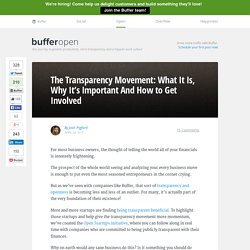

The Transparency Movement: Why It's Important. For most business owners, the thought of telling the world all of your financials is intensely frightening.

The prospect of the whole world seeing and analyzing your every business move is enough to put even the most seasoned entrepreneurs in the corner crying. But as we’ve seen with companies like Buffer, that sort of transparency and openness is becoming less and less of an outlier. For many, it’s actually part of the very foundation of their existence! More and more startups are finding being transparent beneficial. To highlight those startups and help give the transparency movement more momentum, we’ve created the Open Startups initiative, where you can follow along in real time with companies who are committed to being publicly transparent with their finances. Why on earth would any sane business do this? Let’s dive in and take a look at the transparency movement and what it could mean for your business—and for business in general!
The start of a movement Why transparency matters P.S. An ocean apart? Let me tell you a story that illustrates the clash between the American and the European approach to leadership, which I was told by a European executive of an American-founded consultancy.

The company had underperformed the markets for many years and finally the leaders decided to arrange a global get-together with all consultants to discuss ways of changing this. The European executives, expecting a sober review of problems, were surprised to find that the meeting felt more like an evangelical gathering, in which the CEO articulated highly ambitious goals for the future to rapturous applause. The European executive I spoke with had gently asked at the end of the presentation what changes the organization might make to achieve these results. That evening, his regional manager took him aside and told him that the CEO was “fuming mad with him”. Positivity and Optimism The story above illustrates the gulf with respect to emotional mindset of the two Western cultures. Our Advice. Is YouTube killing the traditional games press? There's been a notable shift in the video game industry that many traditional game critics would rather turn a blind eye to than investigate.

It's the rise of the "YouTuber," pulling in hundreds and thousands of rabid fans and causing incredible traffic and sales spikes for game developers, while the written word continues to trundle along, looking more and more quaint with each passing day. Getting covered by a big-name YouTuber is now essentially the dream of many game developers. The publicity someone like TotalBiscuit, NerdCubed or Northernlion can bring you compared to mainstay consumer websites like IGN, GameSpot and Game Informer is becoming increasingly significant.
A year ago, I would have advised any developer to get in touch with as many press outlets as possible, as soon as possible. I still advise this now, but with the following caveat: You're doing so to get the attention of YouTubers. However, his quick reactions game 10 Second Ninja has told a different story. Publishers: who needs them? Publisher 3.0: In his new regular column, Mastertronic CEO and AppyNation founding partner Andy Payne describes No one does.

A quick look at a generic online dictionary definition and it says something like ‘a company or person that prepares and issues books, journals, or music for sale’. Okay, that dictionary must be a bit old, but add games in to it and you get the picture. Why We Make Bad Decisions. THE ART OF PITCHING - Syd Field. Make no mistake; pitching is an art.

Every screenplay begins with an idea and if you want to write a screenplay based on your idea, then the chances are you’re going to have to pitch it to someone; it could be a producer, a director, a production executive, an agent or anyone in the business. A pitch is nothing more than a verbal presentation of a notion, concept, situation, idea, or story. It can be augmented with photographs, casting suggestions, newspaper articles, clippings, or anything else that will help you in the “selling” of your idea. When we talk about pitching, we’re talking about the presentation of an idea. That means it’s your responsibility to convince a production executive (s), or agent, or producer, whoever it might be, that your idea is so good, so unique, so hip, that they want to develop it into a screenplay and pay you for doing it.
In any pitch meeting you’ve got about 15 or 20 minutes to do your stuff. What do studio executives look for in a pitch? Good luck.